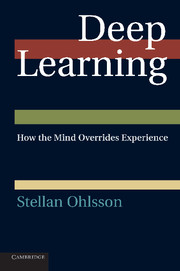10 - Belief Revision: The Resubsumption Theory
Published online by Cambridge University Press: 25 January 2011
Summary
… the act of judgment that leads scientists to reject a previously accepted theory is always based upon more than a comparison of that theory with the world. The decision to reject one paradigm is always simultaneously the decision to accept another…
Thomas S. KuhnBeliefs can be expressed in discourse (I believe that …; In my opinion …), but they are consequential primarily because they guide action. Only someone who believes that the Earth is round would set sail for China by sailing west from Europe, and only someone who believes that a nuclear chain reaction is physically possible would try to build a nuclear power plant. In everyday life, mundane actions are guided by myriads of beliefs of smaller scope: If you believe that the movie starts at four o'clock, you will try to be at the theater shortly before that time. Beliefs can inhibit action as well as guide it. In the late 19th century, some argued that rockets could not work outside the Earth's atmosphere because the rocket exhaust would have nothing to push against. If this belief had persisted, people would presumably not have built rockets for space travel and there would have been no moon walks.
The outcomes of actions reflect back on the belief or belief system that guided those actions. There can be no better way to become convinced that the Earth is round than by circumnavigating it. The success of the action, the triumphant homecoming, increases confidence in the relevant belief.
- Type
- Chapter
- Information
- Deep LearningHow the Mind Overrides Experience, pp. 329 - 360Publisher: Cambridge University PressPrint publication year: 2011



